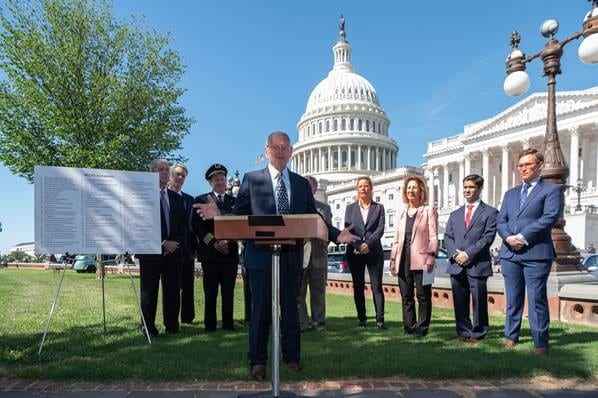Latest News
Sen. Inhofe Leads Bill to Hold Ligado Responsible for Costs to Mitigate GPS Interference

U.S. Sen. Jim Inhofe at a press conference on June 23 discussing the RETAIN GPS Act. Photo: Inhofe’s office
A bipartisan bill introduced in the Senate on Tuesday would hold Ligado Networks responsible for costs to mitigate all potential GPS interference, not just that associated with government systems, as a result of the company’s plan to build a new commercial L-band network for 5G infrastructure.
Republican Sen. Jim Inhofe of Oklahoma, the top Republican on the Senate Armed Services Committee, is leading the measure. This builds on his previous opposition to the FCC’s decision last year to approve Ligado’s network plan, citing concerns it will place undue risk on GPS reliability.
“GPS and satellite communications don’t only impact our military — we rely on it for so much of our day to day lives, which is why we need to take steps to protect not just the federal government from the harmful decision, but all state and local governments, private entities and consumers too,” Inhofe said in a statement. “When Ligado’s effort to repurpose spectrum causes interference in the infrastructure of those systems, as tests have shown it will, consumers and taxpayers shouldn’t bear the burden of updating countless systems. That cost should only be borne by the responsible party: Ligado.”
The RETAIN GPS and Satellite Communications Act, co-sponsored by Sens. Tammy Duckworth, D-Ill., and Mike Rounds, R-S.D., would require Ligado to cover the cost of addressing any interference caused to commercial devices. The lawmakers’ statement notes that “99% of the more than 900 million GPS devices found in the United States are used by the private sector,” while the FCC had previously specified mitigating measures only to government systems.
The FCC’s Ligado network approval has been hotly contested. Congress has previously pushed to prohibit the use of Pentagon funds to comply with the FCC’s order until an assessment is conducted on the risks to GPS signals, citing senior U.S. Department of Defense (DoD) officials’ concerns on the potential for interference with military systems. Aerospace and satellite companies and other stakeholders that use GPS signals have also sought to stay the FCC’s decision, but have not been successful.
The bill introduced Tuesday came with the support of the Aerospace Industries Association (AIA), Blue Origin, Cubic Corporation, Esri, Iridium, L3Harris, Lockheed Martin, Skytrac, and companies in many other industries that use GPS.
Iridium CEO Matt Desch issued a statement in support of the bill. Iridium operates an L-band satellite network and has fought Ligado’s plans for years.
“Despite decades of obfuscation by Lightsquared and Ligado, one fact remains: their plans to enrich their shareholders do little for 5G progress or US competitiveness, but will instead impact hundreds of private sector companies that keep people safe, provide innovative services that make consumers’ lives better and serves as the backbone of the United States economic engine,” Desch commented. “A diverse coalition of industries, bipartisan congressional leaders and United States federal agencies are unified that Ligado’s plan is clearly an unacceptable risk that threatens our nation’s critical satellite services infrastructure.”
The GPS Innovation Alliance is in support of the legislation as well, saying that this legislation focuses on small business, consumers, and other civilian users. GPSIA said the FCC has failed to acknowledge the economic impact to these users. “The RETAIN GPS Act corrects this inequity by placing these costs with Ligado, as the license holder and source of interference,” GPSIA said.
Ligado is moving forward with plans to deploy its network. Earlier this week, Ligado said it has received approvals from wireless standard organization Third Generation Partnership Project (3GPP) to deploy its L-band spectrum in 5G networks. This approval will allow Ligado to expand its vendor ecosystem.
A version of this article was first published by our sister publication Defense Daily.
Get the latest Via Satellite news!
Subscribe Now